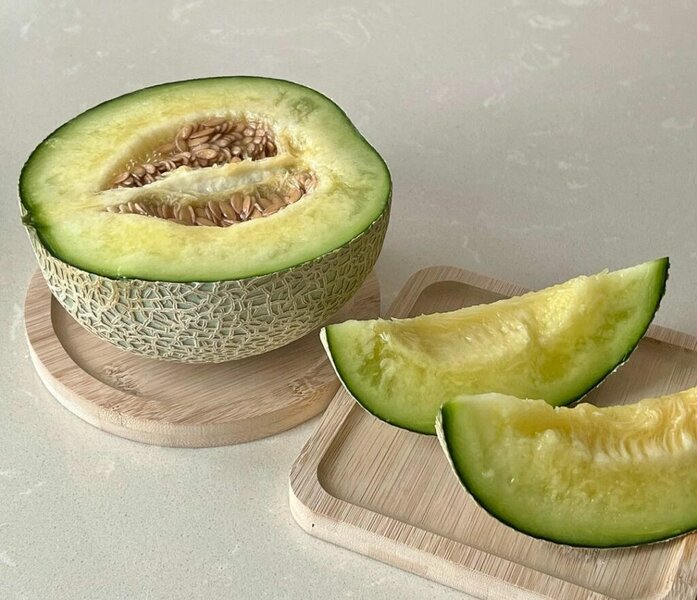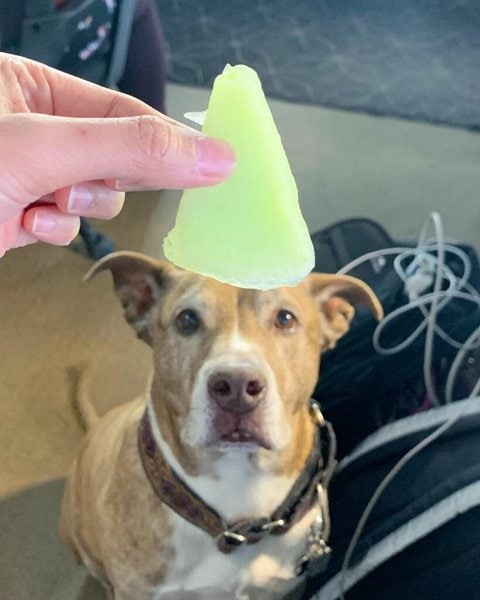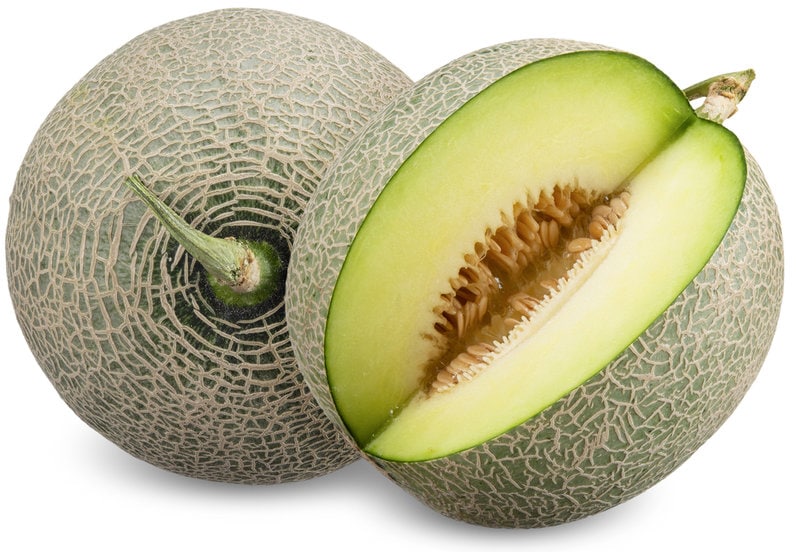After a hectic day at work, you bought a honeydew melon while returning home. As you start to munch on it, your pup comes near you, hoping to get a bite of the melon. You know how nutritious honeydew melons are, but you are not sure if it’s safe to give dogs to eat. The question keeps flashing through your mind – can dogs eat honeydew melon?
Yes, honeydew melon is indeed safe for dogs to eat. It is known to be an excellent source of vitamin C and other vitamins that boosts immune health and improves the digestive health of canines. In addition, honeydew melon helps dogs stay hydrated. Always ensure you feed it to your dog in moderation.
To know more about the enormous benefits of honeydew melons for your canine, we encourage you to keep reading this article. Before we discuss the benefits of honeydew melon, let’s consider how much honeydew melon a dog can eat.
What Are The Benefits Of Honeydew Melons In Dogs?

Unlike cantaloupe with orange flesh, honeydew melons appear green in color. These green-fleshed fruits are crucial for strengthening the immune system. Furthermore, a healthy immune system helps in the prevention of diseases and the maintenance of vision and skin health.
Honeydew is also a fantastic source of antioxidants and minerals. Your dog will benefit greatly from consuming a moderate quantity of honeydew melon.
Minerals aid bone, brain, and muscle health ensuring that your pooch stays active and functional. The antioxidant effects of these nutrients also aid in the prevention of cancer.
Dietary Fiber
Dietary fiber ensures proper bowel motility by adding bulk to your canine’s diet. Your pet will find it easier to pass stool and will be less likely to suffer from constipation.
Fruits that are high in dietary fiber with their low calorific content, like honeydew melon, also ensure that your doggy gets full on time and does not overeat or gain excessive weight.
Antioxidants
Honeydew melon is known to contain two powerful antioxidants – lutein and zeaxanthin. These two antioxidants are crucial in preventing vision-related problems in dogs and humans.
Vitamin C in honeydew melon boosts the immune system. One cup (6.24 oz) serving of honeydew melon gives your canine the required daily intake of vitamin C.
Water
Honeydew melons contain 90% water and make a nutritional and healthy option for a fruity treat. Cold treats provide excellent hydration on hot days to help your furry friend stay cool and happy.
You need not hesitate or worry about feeding your pup a couple of melons. Just make sure they are prepared in bite pieces your pet can consume.
Make sure the rinds have been completely removed to prevent a digestive problem. Honeydew melons are highly nutritious and a very good dietary addition to your furry companion.
Can I Give Honeydew Melon To My Dog Every Day?
No, it is actually not safe to give your dog honeydew melon every day. When you do, make sure you give it only in moderation. But giving your pup a variety of fruits every day is better.
Like humans, dogs also get tired of eating the same thing repeatedly. To prevent this, a variety of fruits would do the trick.
Due to the high content of vitamin C in honeydew melon, avoid giving it to dogs with kidney issues and diabetes. Make sure you are around to supervise your canine when you give it honeydew melon in case of a choking emergency.
How Much Honeydew Can A Dog Eat?

For an average size dog, give only one-quarter of the melon to your pup at once. But if your dog is large, you can give half of the melon to it. Ensure that melons are soft and cut into bite-size pieces that your pup can easily consume.
Honeydew melon is filled with lots of sugar. So give it to your dog only in moderation. Giving excess amounts to your dog would cause a stomach upset.
In addition, apart from stomach upset, giving excess honeydew melon to your furry friend will also cause loose stool. Therefore, moderation is key when giving honeydew melon to your pooch.
However, if your dog is diabetic, giving honeydew melon to it will cause more harm than good. Honeydew melon contains a high amount of sugar, which can further harm your diabetic dog via seizures or an induced coma.
Is Honeydew Melon Toxic For Dogs?
No, honeydew melon is not toxic to dogs, as long as they eat it in moderation. However, the rinds found in honeydew melon are harmful to dogs. If ingested, it can cause abdominal obstruction in dogs.
As mentioned earlier, honeydew melon should only be consumed in moderation by dogs due to its high sugar content.
Furthermore, always remove the rinds and seeds before offering them to your canine. Consult your veterinarian before feeding melons to your diabetic dog.
Larger pieces, seeds, and rinds can constitute a choking hazard, especially in small-sized pups. Make sure your pup does not eat too much at once, as the fruit contains a lot of sugar and can cause tummy problems.
Can Dogs Eat Honeydew Melon Rinds?
No, It is not advisable to feed your pet the rinds from honeydew melons or any fruits for that matter. The rinds from honeydew melons and most other fruits are difficult for your dog to digest, and this will pose abdominal trouble for it.
If your canine mistakenly ingested the rinds, watch out for signs of abdominal obstruction. The symptoms of abdominal obstruction in dogs include the following:
If you notice any of the above symptoms in your dog after eating honeydew melon, call your veterinarian immediately.
Changes in your canine’s pattern of breathing or a hacking sound are an indication of labored breathing. Large pieces of melons and rinds can cause your pet to choke while trying to eat them.
If your pet is diabetic, has heart problems, or suffers from a kidney disorder, avoid offering it melon treats as it will aggravate the condition.
What Happens If My Dog Eats A Honeydew?
Consuming honeydew melon in moderation is safe for your canine. But if your dog accidentally eats the seeds and rinds with them, it will cause internal blockage.
Although the seeds in honeydew melon are not toxic, then they can choke your beloved canine. Always keep an eye on your canine when it is eating honeydew.
We also don’t encourage giving honeydew melon to reward your furry friend due to the high sugar content and the risk of abdominal upsets.
Furthermore, speak to your vet first before giving an overweight dog honeydew melon. Consuming excess honeydew melon will lead to a spike in blood sugar in your canine.
Some signs of high blood sugar in dogs include:
- Excess hunger
- Depression
- Increased urination
- Weight loss
If you notice any of the above symptoms in your canine, call your veterinarian right away!

Can Elderly Dogs Eat Honeydew Melon?
Yes, but in smaller portions. Older dogs require a well-regulated diet essential to meet their health needs. The digestive systems of most dogs slow down considerably with age.
Compared to their younger counterparts, elderly dogs have a weakened digestive system. For this reason, older dogs will also benefit from eating honeydew melons in much smaller bite sizes.
Adding fruits like honeydew melons into your dog’s diet is completely harmless. No matter your pet’s age, make sure that it is properly prepared with all rinds removed to prevent digestive and respiratory problems.
When served in moderation, honeydew melons are super healthy and tasty, making an excellent treat.
How Do I Serve Honeydew Melons To My Dog?
Small and regular servings of melon are beneficial to your pet’s health. First, remove all the seeds on the fruit and cut honeydews into bite-friendly pieces that your pet can eat based on their size.
Please keep a close watch on your pet while they are around melons to prevent health hazards related to their consumption.
You can mix honeydew into your canine’s meals or give it as a healthy treat in between meals as it is a unique dietary addition and possesses a wide range of benefits.





